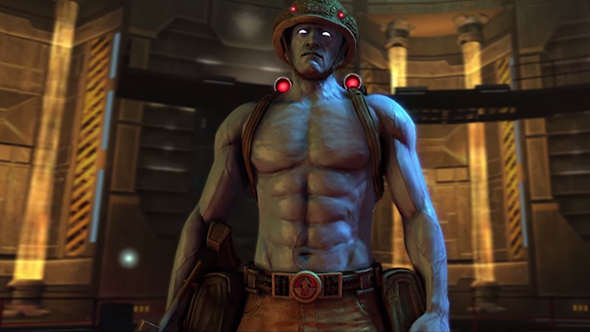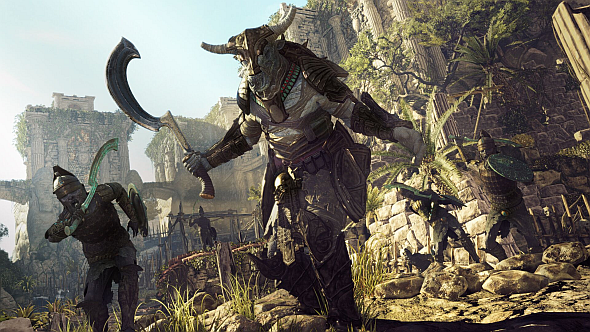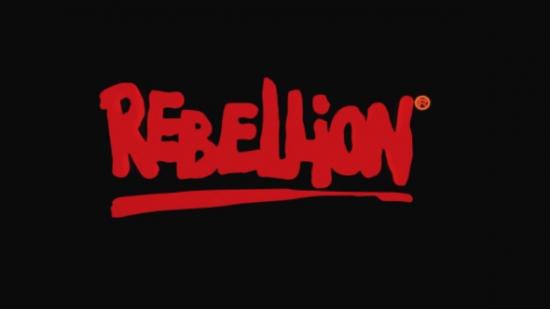Rebellion are in a unique position. As a company that’s independently owned, develop their own games, work in their own engine, do their own face capture and voice recording, and even self-publish, there are few, if no other, UK studios that share this perspective. Their business is also very driven by exporting out of the UK, so we asked its CEO, Jason Kingsley, if he was worried about the imminent threat of Brexit.
Read more: upcoming PC games.
“Brexit is an interesting one,” Kingsley tells us. “It depends from what perspective. I’m always concerned about big changes. The problem we’ve got with Brexit at the moment is that we don’t really know what those changes are going to be. So, in business, you therefore have to expect the worst.”
Those are some of Kingsley’s worries from a business perspective, but how does he feel on a personal level? “I am kind of on the fence really. I’m not a believer in a federal Europe,” he says, “because I think that causes problems and I think there’s almost, that’s the opposite extreme. You’ve got places like Catalonia wanting to do their own thing. You’ve almost got pressure to split into smaller groups where people kind of have a shared history in a different way.”

As a researcher of medieval history, Kingley notes how much change Europe has gone through over time, how much it has endured, how flexible it can be when big changes occur. His main concern about Brexit is his staff. “I’m mostly concerned about staff who are non-British passport holders, and what that means for them,” he says. “I don’t want to lose them, they’re very valuable to us.”
On the flip side, Kingsley believes Brexit could actually present a business opportunity, forcing studios the UK to more aggressively pursue other emerging markets. It is well documented how important China is for huge videogame revenues, for instance. “Our markets are faster,” he explains. “So Europe, North America, as markets, for us, are fairly stable. They’re big, they’re important, but they’re stable. The big growth markets for us are China, India, Brazil, and Latin America – India and other places like that, so Russia. [The EU] is already established, so to get market growth in the EU for computer games is quite hard. But to get market growth in India is relatively easy for us. From a very low base. So it’s pros and cons.”
As it currently stands, with no clear idea of what will happen once Brexit is properly put into action, things are up in the air. “It’s a bit like saying ‘Are you any good at playing this card game?’. And you go, ‘What are the rules?’. ‘Dunno’,” he says. “Well, how can I give you an answer if I don’t know what the rules are?

“My guess is that people will be fairly practical, and there will be a period of uncertainty, there would be a period of increased costs and stuff, and then things will settle back down again. Broadly speaking, Europe – as opposed to the European Union – it’s a brute fact that we’re part of Europe, we’re a very big offshore island but we are part of the geography of Europe. So we’re not digging an even bigger ditch and sailing offshore, we’re still going to be there. So we are still going to be trading with people, it’s just what barriers will be put into place by politicians that matter.”
Outside of concerns for his staff, Kingsley believes that Brexit could work out well for Rebellion as a business, then. However, there are other areas where it could cause problems, with big political issues like this potentially causing more and more rifts between groups of people.
“The biggest concern I’ve got at the moment is the rise of extremism in both forms,” Kingsley admits. “I think the decrease in enlightenment values about logic and reason and discourse, a lot of people seems to become very tribal – you know, you’re right or left, and neither wing has got all the answers, and neither is correct. They’ve all got problems. As usual, in life, reality is more of a middle ground position.”
Rebellion are looking to grow no matter what happens. They are currently planning to extend their studio to fit new hires in when they next ramp up. With Strange Brigade slated for release next year, and other games in the pipeline for after, they will need the space. They have also just announced a slew of licensing deals with other game developers to create videogames in the 2000AD universe, which Rebellion also own.
This is an excerpt from a larger set of interviews conducted for Rebellion’s 25th anniversary – keep an eye on the site for more.
